ETAPPE 2.3 | BLOWER
EXHIBITION OPENING
donnerstag | 11-03-03 | 20.00
nomadenetappe #2 - untere donaulände 12
BLOWER – eine reaktive Installation, die in Logfiles gespeicherte Suchbegriffe in Luftströme umwandelt, und so die häufigsten Schlagworte in ein körperlich erfahrbares Medium transformiert. BLOWER ist eine reaktive Installation. Sie handelt von statistischer Logfileanalyse und Datenrepräsentation. Die Installation ist ans Internet angeschlossen und ermittelt automatisiert mittels Perlskript die Häufigkeit der Suchbegriffe, die InternetnutzerInnen zu einem bestimmten Webserver führen. Maximal 150 dieser Schlagwörter korrespondieren mit 300 gestapelten Lüftern. Dort erzeugen häufig verwendete Suchanfragen einen stärkeren Luftstrom als seltener vorkommende. Ausgehend von der Frage, nach welchen Begriffen gesucht wird, findet man so eine der seltenen Situationen, bei der BesucherInnen ihren Wunsch oder Begehren mitteilen. Die Motivation für den Websiten-Besuch lässt sich so relativ einfach herausfinden. BLOWER macht dieses statistische Datenmaterial als Luftstrom erfahrbar. Zusätzlich werden die gewonnenen Daten per Bluetooth an die Mobiltelefone der AusstellungsbesucherInnen versendet. Jede BesucherIn einer Website hinterlässt Spuren, egal ob es sich um Menschen oder Software (Suchmaschinen) handelt. Diese Spuren werden in den Logfiles aufgezeichnet. Die Auswertung dieser Protokolldateien lässt Rückschlüsse auf die Nutzung von Websites zu. Auch wenn eine Logfile-Auswertung nichts über die tatsächliche Qualität und den Inhalt der übermittelten Daten aussagt, liefert sie doch eine messbare Tendenz der Bedeutung der Wörter. Zum Beispiel kann eine Logfileanalyse einen Hinweis auf die soziale Relevanz einer Website geben. Ein zentraler Punkt der Arbeit ist die künstlerische Erforschung der Repräsentation von Techniken und Grundlagen, die unter anderem in der Marktforschung für statistische Visualisierungen benutzt werden. Die Kombination aus akkurater Statistik und beschleunigtem Luftstrom stellt sich als absurdes Theater dar, aber auch als Kritik an allgegenwärtiger Datenvisualisierung.
KünstlerInnen:
Markus Decker arbeitet seit 1995 an Noise, Techno und audio-visuellen Experimenten.
Seit 1993 hat Karl Heinz Jeron Internetprojekte im Kunst- und Kulturkontext realisiert; bis 2005 in Zusammenarbeit mit Joachim Blank. Er arbeitet an hybriden Projekten, die das Internet und die Informationsgesellschaft thematisieren, sich jedoch in Form von Objekten, Installationen und Events auf den Raum ausdehnen. Von 1999 bis 2006 hat er an der Universtität der Künste Berlin unterrichtet. Seine Arbeiten werden national und international ausgestellt, unter anderem von ZKM Karlsruhe, Ars Electronica Linz, Documenta 10, ICA London, Walker Art Museum Minneapolis.
Als Künstlerin arbeitet Us(c)hi Reiter an konzeptionellen, wie performativen Setups mit unterschiedlichen Medien und kollaboriert mit verschiedenen Gruppen und Künstlerinnen seit 1998. Seit 2005 leitet sie die Netzkultur-Initiative servus.at und beschäftigt sich intensiv mit der Entwicklung von FLOSS (Free/Libre Open Source Software) und dem Einfluss auf digitale Kunst und Kultur.
-----------------------------
BLOWER – a reactive installation that takes webserver logfiles and represents search terms by fan airflow and so transforms abstract notions into a corporeal medium.
BLOWER is a reactive installation. It deals with statistic logfile analysis and data representation. The installation is connected to the internet and automatically determines through a perl script the search terms employed to find a a specific web host. The first 150 search terms are connected to 300 stacked fans. Popular search terms create stronger airflow than less popular. Starting from the question what are the terms people search for, one finds oneself in one of the rare situations where visitors disclose their wishes and desires. Thus the motivation for the website visit can be identified quite easily. Through BLOWER the exhibition audience can experience this statistical data material directly. Additionally the data is send by Bluetooth to the visitors' mobile phones.
Every user of a website leaves behind data traces, no matter if they are human or software (like search engine robots). These traces are recorded in the logfiles. Through the evaluation of these protocols one can infer how the website is used. Though a logfile analysis cannot reveal anything about the actual quality and content of the transferred data, it still gives a measurable tendency of the meaning of words. For example a logfile analysis can provide an indication of how socially relevant a website is. A central point of BLOWER is to artistically explore how the technical procedures and basic principles, which are used for example in marketing for statistical visualisations, are represented. The combination of accurate statistical methods and accelerated air flows presents itself as absurd theatre and at the same time as a critique of ubiquitous data visualisation. Artists:
Markus Decker works since 1995 on noise, techno and audio-visual experiments.
Karl Heinz Jeron has realized internet projects in the context of art and culture since 1993; until 2005 in collaboration with Joachim Blank. He creates hybrid projects which deal with the internet and the information society and span the physical space in form of objects, installations and events. From 1999 to 2006 he was a lecturer at the University of the Arts in Berlin. His works are exhibited nationally and internationally, amongs others at the ZKM Karlsruhe, Ars Electronica Linz, Documenta 10 Kassel, ICA London, Walker Art Museum Minneapolis.
As an artist Us(c)hi Reiter works on conceptual and performative setups using electronic and analog media. She works together with different groups and artists since 1998. From June 2005 Reiter runs the non-profit cultural backbone organisation servus.at/Kunst & Kultur im Netz (www.servus.at) and researches Free/Libre/Open Source Software in the frame of art and cultural production.
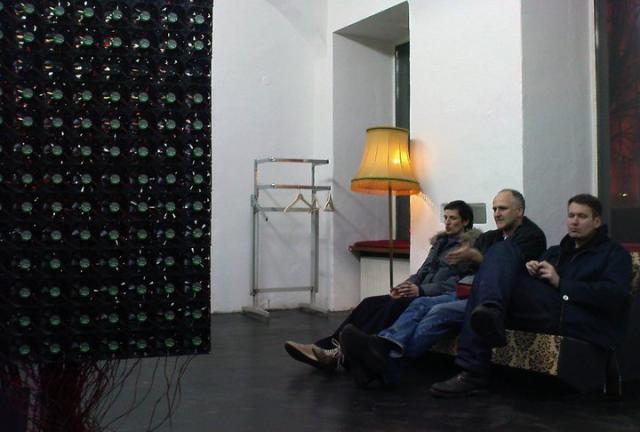
v.l. Us(c)hi Reiter, Karl Heinz Jeron, Markus Decker
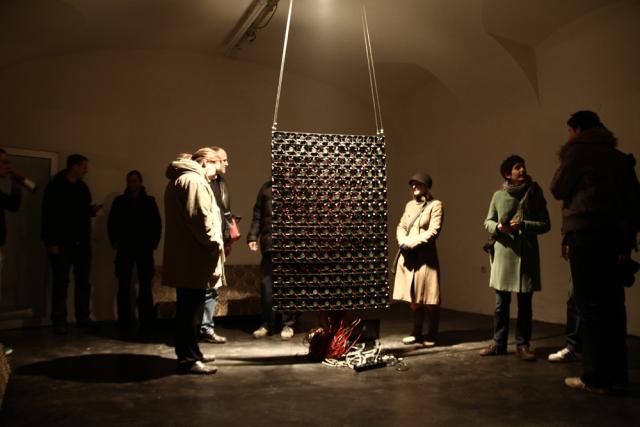
vernissage
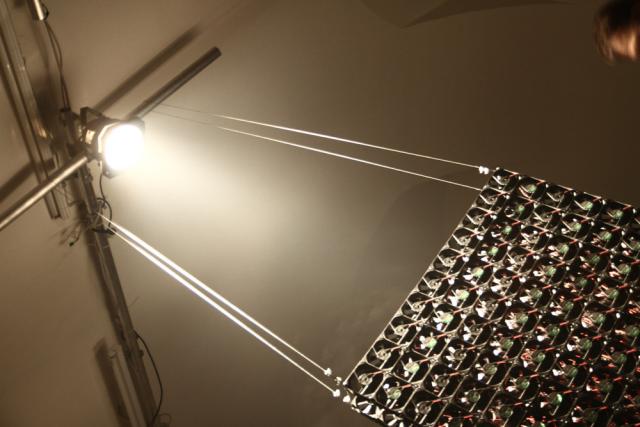
blower
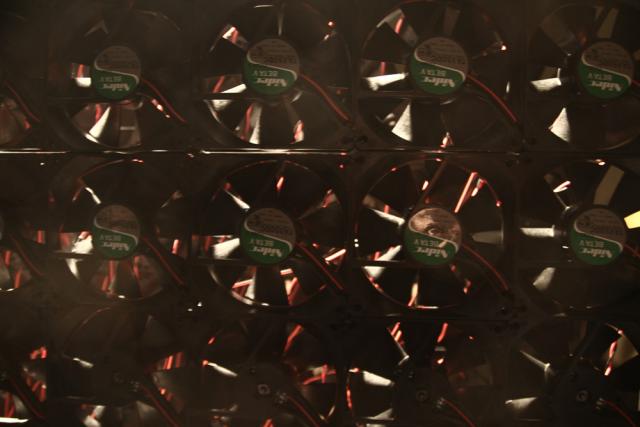
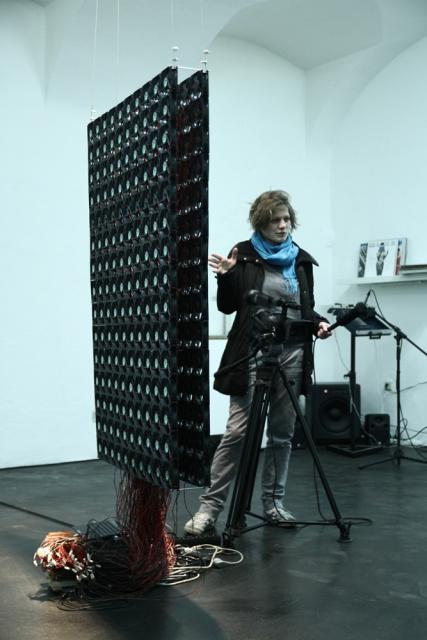
dorf interview